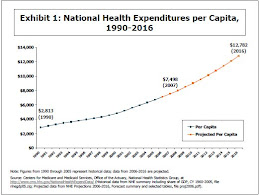There are many reasons that contribute to the increase in national health spending per capita. I think the main problem is the inefficiency of our health care system. Funds are placed in areas that do not seem to be improving health services at the same rate that spending is increasing. Advancements in technology are definitely costly and they do contribute to the rise in spending. However, what good is this technology if it is not easily accessible to the people who most need it? It makes sense that if more funds were placed into preventive care and primary care then it would not be so costly to keep Americans healthy. It is more costly for a person to try to cure a disease than taking the necessary precautions to prevent the illness. Although diseases many times are due to genetics, they are often brought upon or worsened by individual’s lifestyles and behaviors. But the U.S. seems to operate on a system that favors profit over health. There is a hierarchy in the U.S. health care systems that favor insurance companies, physicians, employers, and lastly patients. From personal experiences I have come to see many a times cases where health practitioners seem to ignore certain health conditions of patients and allow them to worsen before they decide to take the correct and necessary action. To keep my opinion clear, I do not think this true of all physicians. For example, my father was injured at work and sent to medical services through the employer’s insurance. His back pain would impede him from regularly attending work. The physician would advise for massage therapy and medicine to control his back pain that would only alleviate momentarily. My father decided to seek a second opinion and sought medical service aside from his employer’s insurance. In reality my father needed a costly surgery of which the employer was trying to avoid.
I also think that if there were a universal health care system that offers affordable healthcare for everyone and is driven to maintain patient’s health, then spending would probably be more efficient and less costly. Too much money is being spent on creating and maintaining multiple programs that only help limited and selected populations. Money is spent in patching up the flaws in our system, when it might be more cost-efficient to invest in a whole new system.
Subscribe to:
Post Comments (Atom)

No comments:
Post a Comment